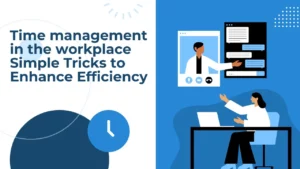Introduction
Daily, at the workplace individuals are exposed to situations like meeting short deadlines, managing multiple tasks and spending an average of 9-12 hours, which can often lead to distress. This unaddressed and prolonged distress at work can gradually lead individuals to experience a lack of concentration, increase absenteeism, and reduce overall productivity and well-being. So here, counseling plays an important role as it creates a safe space for the workforce to communicate about their workplace concerns and learn healthy and effective ways by which they can tackle these dynamic situations.
Counselling at the Workplace
“Workplace counseling refers to the ability to deal with issues that occur within an organization, such as conflict, stress-related absence, work-related trauma, and harassment or bullying” (Hughes & Kinder, 2007).
Counseling at the workplace plays an important role for a number of reasons. It provides a safe environment for employees to freely express their workplace-related concerns in a judgment-free and unbiased space. Workplace counselors have a clear lens to understand the stressors that the workforce might be experiencing. Their expertise helps them better understand the stressors and concerns of the employees.
As a counselor is already aware of the culture and practices of the organizations, it helps them to understand where employees’ concern lies. A lot of organizations these days have in-person counselors, as it makes the process much more convenient and accessible for employees to go and take sessions. Goal of a workplace counselor is to help employees to learn healthy strategies by which they can deal with their stressors.
Counselling for Work Stress at the Workplace
Usually, employees are exposed to situations that might be stressful, like tight deadlines, interpersonal conflicts, a lack of recognition, and many more. These things might lead to stress and if not managed properly can impact an individual’s mental health, leading to poor performance and burnout (Gabriel, K. P., & Aguinis, H).
Here, counseling plays a significant role as it offers a space for the workforce to openly talk about the issues that might be distressing to them in a judgment-free environment. Counseling helps employees to explore and identify the situations at the workplace that elevate their stress. Post counseling as an individual you get to identify the situations that can lead to stressors which helps you to go down and dig deeper into the underlying cause. The counselor actively explores with an employee the practical strategies that can help them regulate their emotions as well as their behaviors healthily. This helps an individual to manage their stress effectively. When an individual can identify their stressors effectively, it encourages them to be self-reliant. This boosts the confidence of the employees to think clearly and make better decisions, leading to an increase in performance.
Importance of Counselling at the Workplace

1 Employee job satisfaction:
When an organization takes care of their employee’s mental well-being it helps to bridge the gap between employer and the workforce. It gives an insight to the employees that they are being valued and supported, leading to building trust as well as job satisfaction.
2 Encourages healthy communication:
Counseling fosters the workforce to openly talk about their workplace stressors in a judgment-free space. It helps in conflict resolution at the workplace.
3 Performance and Productivity:
In counseling sessions, employees explore various strategies that they can implement to deal with workplace stressors. This fosters an employee’s ability to think clearly and make accurate decisions.
4 Career Development:
Counseling sessions help employees explore and identify their professional goals. The counselor helps employees to take active steps to achieve them, leading to their growth.
5 Diversity and Inclusion:
Counseling instills a culture where every individual is appreciated for their unique abilities. This helps in creating an inclusive workplace environment.
Types of Counselling Services at the Workplace
Workplace counseling tackles a range of employee well-being issues. First, there is counseling for stress management, which aims to provide workers with coping mechanisms for stressors connected to their organizations. As reported by Griffin & Clarke in their study, it was found that stress is one of the sole reasons for absenteeism at the workplace.
Second, it might be challenging for some employees to develop professional goals. Counseling assists them in exploring and implementing certain methods that can help them reach their objectives, leading to career development.
Counseling creates an environment where every employee acknowledges the presence of each other. Since at the workplace people come from a variety of cultural backgrounds, counseling helps employees to better understand and value each other’s viewpoints. This not only improves teamwork, but also reduces conflict at the workplace.
Employees access Counseling at the Workplace
In today’s world, leaders need to understand and value the need for their employees’ well-being. Leaders can take a step forward and talk about the mental health concerns that they might be faced with while running the organization. This will create an environment where employees feel it is ok for them to talk and reach out for help for their mental health related concerns without the fear of being judged for meeting with a counselor.
Providing access to resources – credible literature on mental health and avenues for help-seeking are essential. This includes connecting employees to empanelled counselors – financially supporting mental health treatment while also ensuring that employees get both the time and space to sustain these sessions. Over the past few years, tele-mental health has grown significantly which can lend to significant boost to such initiatives.
Confidentiality Measures in Counselling at the Workplace
Dealing with challenges at the workplace are inevitable. Unable to deal well with the challenges regularly can often make the employees feel stressed and reduce their work efficiency. Due to the fear of being judged and their concerns being collectively discussed within the work groups employees are further stressed about sharing their concerns. With the promotion of workplace counseling, measures can be established to cultivate confidentiality for counseling.
- With an anonymous reporting system, employees can anonymously request counseling services and seek individual counseling sessions.
- Implementing strict record-keeping practices and limited access to the information shared by an employee during a counseling session can assure the employee of a safe space to talk about their concerns openly.
- Additionally, regular reviews of the confidentiality policies for the workplace can help identify gaps and help reduce the chances of breaches
Conclusion
Every organization wants to create a successful place in the market. For a long time organizations have been only focusing and developing ways by which they can improve the quality of the product. However, it is essential that now employers understand and realize that the physical and mental well-being of their workforce should be the top priority.
Nowadays, some organizations either have their empanelled counselors or they have tie-ups with mental health organizations to create a supportive place where employees can freely talk about their workplace concerns. Counseling also helps to create a stronger bond between the employees and employers as it gives an insight to the employees that they matter. This motivates them to work effectively leading to increased overall productivity.
References
Hughes, R., & Kinder, A. (2007). Guidelines for counselling in the workplace, BACP
Gabriel, K. P., & Aguinis, H. (2022). How to prevent and combat employee burnout and create healthier workplaces during crises and beyond. Business Horizons, 65(2), 183–192. https://doi.org/10.1016/j.bushor.2021.02.037
Griffin, M. A., & Clarke, S. (2011). Stress and well-being at work. In S. Zedeck (Ed.), APA handbook of industrial and organizational psychology, Vol. 3. Maintaining, expanding, and contracting the organization (pp. 359–397).










